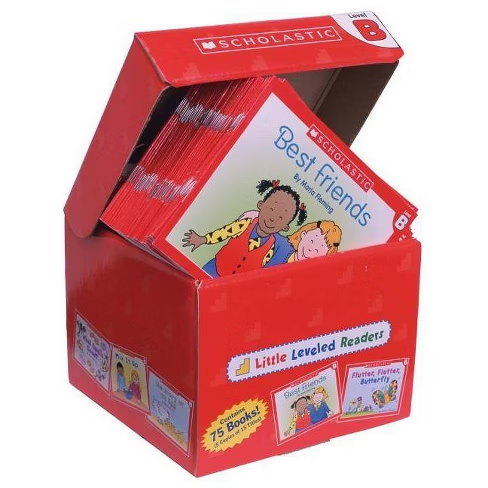Decodable Books vs. Leveled Readers: What’s Best for Your Child’s Early Reading Journey?
- Taylor Sofranko
- Oct 11, 2024
- 4 min read
Updated: Apr 4, 2025
When it comes to helping young children learn to read, parents and educators are often faced with a big question: Should we use decodable books or leveled readers? Both types of books are designed to support early readers, but recent research in the science of reading shows that decodable books give children the edge they need to become confident, successful readers. Let’s break down the differences and see why decodable books may be the best choice for building strong reading skills.

What Are Decodable Books?
Decodable books are designed to match the sounds children have learned in their phonics lessons. They contain simple, phonics-based words that kids can easily sound out (or decode). For example, if a child has learned short vowel sounds and consonants, they’ll be able to read words like “cat,” “sip,” or “fun” in a decodable book. The text is carefully structured to help kids practice their letter-sound knowledge in a way that makes sense.
Key Features of Decodable Books:
Words follow phonics rules that children have learned.
Patterns and sounds are introduced gradually.
Children are encouraged to sound out words independently.
Research in the science of reading supports decodable books because they help kids develop essential decoding skills. These skills allow them to map sounds to letters in their brains, making reading more automatic over time.
What Are Leveled Readers?
Leveled readers work a little differently. Instead of focusing on phonics, these books are categorized by reading levels that progress in difficulty. Leveled readers often include more complex words and rely on picture clues or context to help children figure out unknown words. The goal is to build comprehension and fluency, but many of the words in these books aren’t easy for young readers to sound out based on phonics alone.
Image source: https://www.target.com/p/little-leveled-readers-level-b-box-set-by-scholastic-hardcover/-/A-77264277
Key Features of Leveled Readers:
Books are grouped by difficulty level (often A-Z or 1-20).
Children may need to guess words based on pictures or context.
Focuses on overall reading level and comprehension.
While leveled readers can be useful for practicing comprehension, the science of reading shows that children need strong decoding skills first. Relying on guessing strategies (like using pictures) can sometimes lead to gaps in a child’s ability to decode words independently.
What Does the Science of Reading Say?
The science of reading is clear: explicit, systematic phonics instruction is the most effective way to teach children how to read. Research shows that when children learn to break down words using phonics patterns, they build strong neural pathways for reading. This is where decodable books come in! By using decodable texts, children get plenty of practice with the phonics skills they’re learning, helping them build confidence in their ability to read new words.
Dr. Mark Seidenberg, a leading researcher in literacy, explains that phonics helps children map sounds to letters, which is the key to developing fluent reading. Leveled readers, on the other hand, don’t always give children enough opportunities to practice decoding, which is essential in the early stages of reading.
Why Decodable Books Are a Game-Changer
Here’s why decodable books are such a powerful tool for early readers:
They Reinforce Phonics Instruction: Decodable books are designed to match the phonics skills your child is learning in school. This means they get the chance to practice reading words they’re familiar with, boosting their confidence and skill set.
They Reduce Guessing: Unlike leveled readers, which often encourage kids to guess words using picture clues, decodable books help children rely on phonics rules to figure out new words. This builds a stronger foundation for future reading success.
They Build Confidence: Because decodable books use words that are easier for children to sound out, they’re more likely to experience success when reading. That sense of accomplishment helps build self-confidence and motivates them to keep reading!
Do Leveled Readers Still Have a Place?
Absolutely! Leveled readers can be a great addition to your child’s reading routine, as long as decodable texts are prioritized and read first. Once your child has practiced their phonics skills with decodable books, they can enjoy leveled readers to build comprehension and expand their vocabulary.

It’s also important to let your child pick out high-interest books that capture their imagination. Reading independently or with support—whether it’s a favorite storybook or a leveled reader—can help foster a love of reading and make reading time something to look forward to. The key is balance: decodable books build essential reading skills, while leveled readers and other high-interest texts keep reading fun and engaging!
What’s the Verdict?
For young readers, especially in PreK through 2nd grade, decodable books offer a more structured way to build foundational reading skills. Leveled readers can come later, once your child has mastered the basics of phonics and is ready to tackle more challenging texts. By using decodable books, you’re setting your child up for long-term success as a confident, independent reader.
Want to Support Your Child’s Reading Journey?
At TAS Literacy, we specialize in using the science of reading to help children build the skills they need to thrive. Whether your child is just starting out or needs extra support, we are here to help! Feel free to reach out to schedule a tutoring session or to learn more about how we can support your child’s reading development. Contact us here.
Be sure to sign up for our monthly newsletter to receive exclusive literacy tips, free resources, and updates on upcoming events straight to your inbox. Stay connected and support your child’s reading journey!
Happy reading!
Taylor Sofranko-Sutherland
Founder, TAS Literacy






Comments